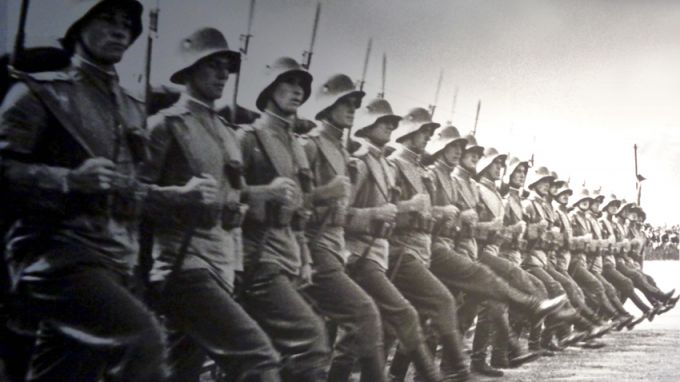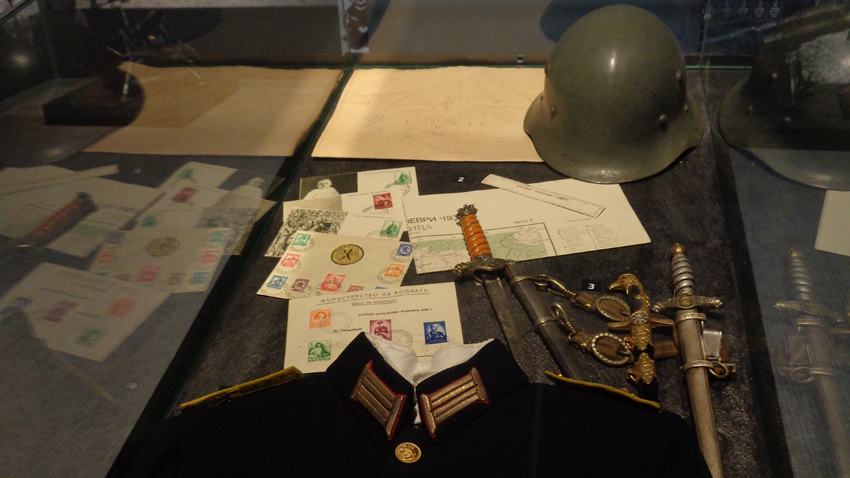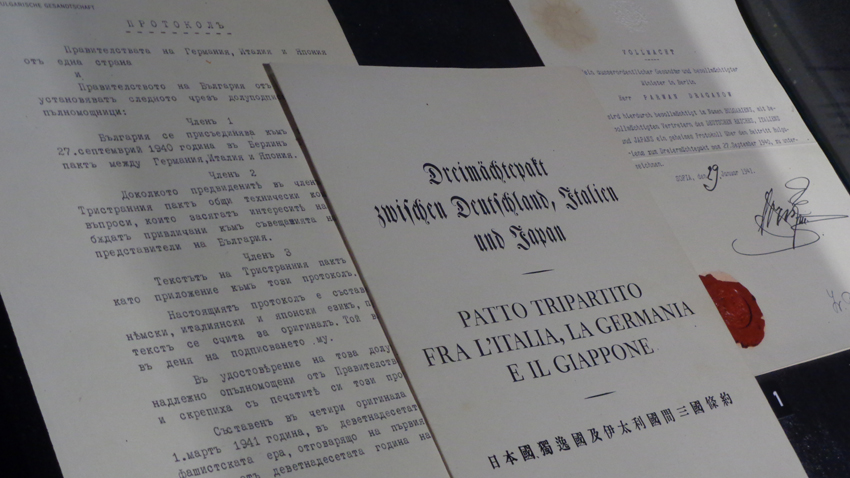 3
3
Bulgaria and World War Two. Could we avoid the largest military conflict so far? Taking this question is Associate Prof. Dr. Sonya Penkova, director of the National Museum of Military History. The occasion is the large-scale exhibition named The War We Couldn’t Have Avoided. It is dedicated to the 70th anniversary of the global conflict’s end.
“Our exposition asks the same question and we look for the possible answers,” the expert says. “According to our team, the state had no other option, but to participate. Bulgaria was simply forced by the events across Europe to join the action. It managed to stay neutral for quite a long time, but at one point things went out of control.”

Sonya Penkova gives an example with the so-called symbolic war declared by Bulgaria and under German pressure to the USA and Great Britain. It had no plans on real actions against those states. However, it turned into reality with the bombs thrown over Sofia and the air battles. At the end of the war, this country took its share of land action, fighting for the anti-Hitler coalition – the USA, Great Britain and the USSR.
What is the pre-history of the Bulgarian participation? Bulgaria was among the defeated ones after WWI and its strife for national unification ended up with the unfair Treaty of Neuilly-sur-Seine, which even tore apart more lands from its territory, inhabited mostly by Bulgarians. Thus the vision of a peaceful revision of the status quo after the first global conflict began to appear among the Bulgarian political elite of the 1920s – 1930s. Opportunities for national unification were sought for, without any war forecasts. However, the events themselves and what the Great Powers offered determined quite clearly Bulgaria’s participation in one of the coalitions which were being formed. In the beginning of 1941, Germany won the battles against the British-French coalition along European fronts and the USSR acted as an ally to the Germans.

“The Bulgarian elite were well aware, after the start of the European war, of what happened to states, much stronger in their military potential and resources. It became clear with the German actions across Europe, as well as with the actions of Soviet Russia to the East. So, the war was approaching in a slow, but steady pace. The decision that the governing men had to take was how to preserve Bulgaria from any participation in the war, at the same time trying to reach some implementation of the national unification utopia. South Dobrudja was taken back with diplomatic actions only, using the relations between the Great Powers during the start of the war.”
However, the war was still approaching and it excluded any peaceful options for the state. The German decision for a military campaign in the spring of 1941 resulted in huge pressure towards Bulgaria, demanding its joining on the side of the Axis. It had to provide corridors for the military actions. After the 1941 Pearl Harbor raid of the Japanese, Germany forced all its European allies to declare war on the USA and Great Britain.
We must say here that one of the brightest acts of humanity over the entire WW2 took place in Bulgaria, which saved its 50,000 Jews from the Holocaust. The pontiffs of the Bulgarian Orthodox Church defended them, along with 43 MPs, headed by Deputy Chair of Parliament Dimitar Peshev, intellectuals and average citizens. Tsar Boris III also showed prescience in his political decision.
What is Bulgaria’s share in the defeat of Hitlerism?
“After the 9 September 1944 coup d’etat Bulgaria took the side of the anti-Hitler coalition, after a series of attempts to do it earlier. It took part in the final phase of the war and in its very end Bulgarian troops fought up to May 15 within the third Ukrainian front, even days after the official end of the conflict.”
The country’s participation in the final stage might be important, but it didn’t lead to all the results we wanted. Yes, South Dobrudja was preserved, but the southern and western territories, torn away after WWI remained outside Bulgaria’s lands. Moreover, the country remained within the Soviet zone of interest for more than 40 years to come.
The exposition is in black and white – photos, documentaries and sounds of the war. One can hear the speeches of politicians, memories of participants etc. Numerous interactive applications add to the image of the global conflict. There are touch screens provided for the youngest visitors. The exhibition will be displayed till end-February.
English version: Zhivko Stanchev
Photos from the exhibition are taken by Veneta Pavlova152 years after Bulgaria lost its beloved son and advocate for a free, independent and tolerant state – Vasil Levski, his personality continues to excite and inspire Bulgarians from all generations. Scholars continue to study the work of the Apostle..
Vasil Levski is a Bulgarian revolutionary and national hero who fought for the Liberation of Bulgaria from the Ottoman Empire. He is an ideologist, founder and organizer of the Internal Revolutionary Organization, for which grateful..
Bulgarian Patriarch Daniil will celebrate the first liturgy in London for the consecration of the new church of the Bulgarian Orthodox community in the British capital - the church of Saint Ivan Rilski. T he church is part of the Bulgarian Embassy..
152 years after Bulgaria lost its beloved son and advocate for a free, independent and tolerant state – Vasil Levski, his personality continues to excite..

+359 2 9336 661
